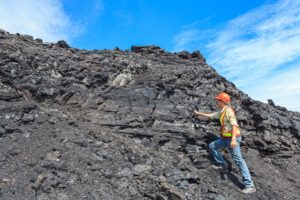
Geologists are specialist Earth scientists that work with rocks and the natural processes associated with rocks.
What Does a Geologist Do?
Geologists work in one of the most important (and oldest) Earth Sciences. Most people are aware that they study rocks in the environment. They also study rock formations and how they are created (for example, the rock layers of the Grand Canyon), what leads to rocks being created (most are compacted organic materials but some are inorganic, formed from volcanic activity) and the natural processes that shape our world. They may examine how natural processes affect rocks such as river formation, for example, and how natural environment is affected by rocks. Rocks can impact the PH level of soils and determine the plant and animal life that thrives there. Their aim is to understand the planet's history and the chronology of individual rock formations. They study the materials of the Earth and the wild processes upon it.
Their wider understanding of the Earth and its processes is also important, not just for the rocks. Geologists may be experts on mudslides and other ground-based natural disasters and what cause them, earthquakes and volcanoes for example. Therefore, they also study the Earth's short-term processes and their impact.
Finally, they study the age of rocks, attempting to piece together a chronology of events for the formation of our land masses and changes over time.
Where Does a Geologist Work?
The majority of geologists work in industry. Their understanding of geological processes means they make great petrochemical prospectors. They will also work planning mining for coal, precious metals and every-day ores. You are just as likely to see them working in conjunction with an iron mine as you are on an oilrig. Nearly one quarter of qualified geologists work in oil and gas extraction.
Approximately one in every six works in engineering services, one in seven in technical and advisory, one in twelve in government facilities (which does not include education or healthcare). Finally, the remaining 7% work in higher education such as universities as lecturers, or as research staff in university labs and departments.
What Is the Average Geologist Salary?
The pay scale for geology is rather complex. It all depends on where the candidate opts to work and there seems to be a greater variation in this field than might be considered normal. Increasingly, there is a job's shortage with geology as there is across all STEM subjects. Wages, therefore, have increased dramatically in the last few years. The median salary for geologists was $93,580 as of May 2020. The highest payer is the oil and gas industry with a median pay of $125,670, followed by those in the federal government, who earned a median salary of $104,210.*
Geology Jobs & Job Description
Geologists have an important job to study the many characteristics and processes of the land, water and other particulate matter that make up the Earth. A job as a Geologist will vary depending on the employer, but generally, the duties and requirements are:
- A Bachelor's of Science degree in geology or related field of study
- Ability to perform work or having experience in various industries, such as mining, environmental assessments, land development, and land remediation
- Ability to be done outdoors in the field in a variety of environmental conditions or in the office to complete reports and paperwork
- Extensive travel may be required depending on employment conditions and projects
- Knowledge of geology and geological factors for location of work site
- Ability to work closely with a team of individuals and share results of geological data within the team and on an interdisciplinary basis
- Excellent verbal communication to interact with management and work team
- Collect and analyze geological information, such as water, soil or rock data
- Ability to write detailed and accurate reports compiling data collection and analysis
- Highly technical to design mappings or graphical representation of information collected
- Ability to comply with all safety codes and standards; ensure work procedures are followed in a safe manner
- Ability to use specialized geological databases and software to complete work tasks
- Acquire permits required to perform projects
- Understand and abide by all federal, state or local laws and codes related to geological work
A management position as a Geologist or a Senior Geologist will require similar skills and duties as an entry level geologist and may also include the following tasks for which years of experience are an asset:
- A Master's degree or Ph.D. in geology or closely related field of study, and experience in the field of work
- Study the relationships between work projects and environmental impact and sustainability
- Develop new methods for geological analysis and data collection that provide the least environmental impact
- Manage sampling and reports from entry-level geologists and provide necessary feedback and recommendations
- Ensure work is conducted on time and project deadlines are being met
- Ability to present data using a variety of media to share results of investigations with stakeholders, clients, governments, or management
- Update skills regularly to learn new and improved methods of geological work by attending workshops and courses
- Manage and oversee contractors, such as drillers and excavators; ensure health and safety compliance for workers
- Manage budgets for geological projects and order materials required
- Attend meetings regularly with management to provide insight into work projects and receive pertinent information
- Provide ongoing training to staff regarding investigations and data interpretation
What Is the Job Demand for Geologists?
Job demand for geology and the geosciences is expected to grow some 7% between 2020 and 2030.* Much of this demand will be specifically for geologists to work in petrochemicals and other fossil fuel related activity. There is already a job shortage and more will be required to fill the demand. The highest demand is in Texas where the largest number of oil and gas businesses are presently located. As demand increases, salaries are also likely to increase. Employment monitoring organizations have noted that average salaries for geologists have nearly doubled in less than a decade.
What Are the Education Requirements to Become a Geologist?
Geology is one of the core STEM subjects and a bachelor's degree will be required at the very minimum for most jobs. In some states and for some jobs (especially where safety issues are concerned - such as in mines) certification may be required to practice. This should not be the case in the overwhelming majority of cases. Most major colleges and universities offer geology degrees so you should not struggle to find a relevant course. In the unlikely even these are not available at your chosen college, geography or other Earth sciences are the preferred options. Students should take minors in math and physics or other Earth science options, and IT related subjects. GIS is one example of a growing and required IT skill in geology.
Although there is a skills shortage, students are advised to study master's degrees due to the applied science and project work that this would entail. Employers prefer graduates with work experience in their chosen field. Summer schools during bachelor degrees are useful too. Doctorates are useful for those wish to pursue a career in academia: teaching, research or both. They are also advantageous for senior positions such as government advisory roles.
Geology - Related Degrees
What Kind Of Societies and Professional Organizations Do Geologists Have?
Geology has a number of professional bodies:
- International Union of Geological Sciences: This international body is the largest international community of its kind. They take a hands on approach, offering programs in education, quality standards and environmental management for stakeholders
- US National Committee For Geological Sciences: The American arm of IUGS examines international issues surrounding geology and geological sciences in an American context and how to best serve our professionals here and abroad
- American Institute of Professional Geologists: AIPG promotes the profession of geology. Although an American organization, it has members abroad and promotes good practice in the geology workplace
*2020 US Bureau of Labor Statistics salary figures and job growth projections for geoscientists reflect national data not school-specific information. Conditions in your area may vary. Data accessed September 2021.





